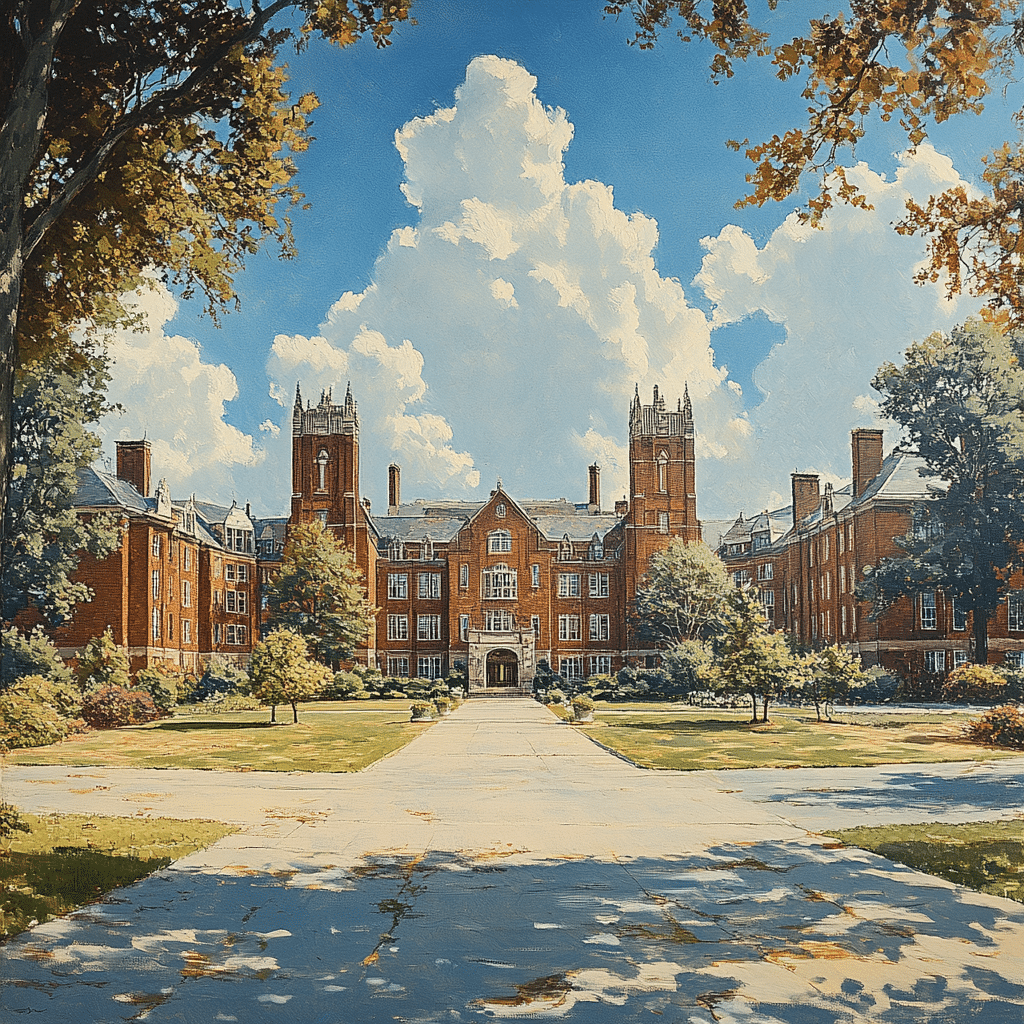Johns Hopkins University is a name synonymous with medical brilliance and groundbreaking research. This prestigious institution has made significant strides in various health sectors, shaping the way we approach medical challenges worldwide. Not only does Johns Hopkins stand tall as a beacon of knowledge, but its innovations constantly influence practices globally. Let’s dive into the remarkable contributions of Johns Hopkins to global health innovations and understand why it sits at the crown of medical excellence.

Top 7 Contributions of Johns Hopkins to Global Health Innovations
At the forefront of cancer research, Johns Hopkins has made transformative strides in oncology. The Kimmel Cancer Center has led remarkable clinical trials, particularly with targeted therapies for breast cancer using HER2 inhibitors. This revolutionary research has saved countless lives and set new international standards for cancer treatment protocols. When it comes to cancer care, Johns Hopkins remains an unwavering pillar of hope.
The Johns Hopkins Brain Science Institute is a powerhouse of innovation in neuroscience. One standout achievement is the introduction of deep brain stimulation techniques specifically aimed at treating Parkinson’s disease. This advancement has drastically improved the quality of life for many individuals suffering from the condition. With ongoing studies enhancing these techniques, Johns Hopkins continues to pave the path for revolutionary neural interventions.
The Johns Hopkins Bloomberg School of Public Health is renowned for producing leaders who make impactful contributions to public health. Its rigorous and data-driven approach helps shape how governments react to health crises. For instance, during the COVID-19 pandemic, Johns Hopkins created a real-time COVID-19 dashboard that provided essential data for monitoring and managing the outbreak. This response not only solidified the university’s status but showcased the critical role of data in public health education.
Johns Hopkins consistently leads the charge in medical technology advancements. The development of robotic surgical systems is just one example of its innovation. These technologies, especially in the realm of minimally invasive surgeries, have dramatically reduced recovery times and minimized complications for patients. By setting new benchmarks in surgical practices, Johns Hopkins reinforces its commitment to enhancing patient care.
Johns Hopkins’s contributions to mental health research have been pivotal. The university has been at the forefront of studying therapeutic psychedelics, particularly the clinical trials focused on psilocybin for treating depression. This groundbreaking research is reshaping how society approaches mental health treatment options globally, reigniting interest in alternative therapies. The effects might lead to a renaissance of new perspectives in mental health care.
With a strong commitment to social equity, Johns Hopkins has championed various community health initiatives, spearheaded by the Johns Hopkins Center for Health Equity. This organization’s efforts address social determinants of health, aiming to eliminate disparities affecting marginalized communities. By integrating community health into its mission, Johns Hopkins sets an example for other institutions aspiring to make a difference.
Collaboration is key at Johns Hopkins. The institution has formed numerous partnerships to strengthen health systems around the globe. Its work with the World Health Organization showcases its influence in managing infectious diseases and improving health governance. These cooperative efforts underscore Johns Hopkins’s dedication to improving health on an international scale.

The Role of Johns Hopkins in Shaping Medical Education
The medical education programs at Johns Hopkins are as impressive as its research contributions. The curriculum emphasizes critical thinking and innovative clinical practices, providing future medical leaders with tools to tackle complex health challenges. Moreover, the close-knit relationship between students and faculty inspires inquiry and collaboration, cultivating a new generation of healthcare professionals ready to engage with pressing medical issues.
This focus on education creates a ripple effect that enhances healthcare accessibility and advocacy. As students graduate and enter the workforce, their experiences at Johns Hopkins equip them to foster positive change in communities across the globe. Through this educational ethos, Johns Hopkins not only shapes individual careers but also contributes to a more connected and responsive healthcare infrastructure.

A Legacy of Medical Excellence and Innovation
Johns Hopkins University’s comprehensive approach to medical excellence interweaves cutting-edge research, public health advocacy, and community engagement. This multidimensional strategy enhances patient care within the institution and sets trends that influencers in the global healthcare landscape embrace. With an unwavering commitment to advancing medical frontiers, Johns Hopkins illuminates paths for future generations of medical professionals.
Ultimately, the legacy of Johns Hopkins as a leader in medical excellence exemplifies the profound impact of academic institutions on health policy formulation and treatment methodologies. As they consistently challenge the boundaries of medical research and education, the promising developments that emerge hold the power to transform lives and foster healthier communities worldwide.
In conclusion, as you seek speakers for your events, consider those inspired by the pioneering spirit of Johns Hopkins. Whether it’s innovators in cancer treatment, advocates for mental health, or visionary leaders in public health, you’ll find a rich tapestry of talent to motivate and educate your audience. It’s time to harness the wisdom and experiences shaped by institutions like Johns Hopkins, propelling us towards a healthier future.
And if you’re curious about some related topics, you might enjoy delving into the latest trends in AI art or exploring augmented reality. Each of these fields offers profound implications for various sectors, including healthcare, enriching our understanding of the world around us.

Johns Hopkins: A Leader in Medical Excellence

A Legacy of Innovation
Founded in 1876, Johns Hopkins University has been a powerhouse of education and research for over a century. The institution is not just known for its rich history but also for its pioneering efforts in various fields, notably in medicine. Fun fact: Johns Hopkins was the first U.S. university to establish a research university model, which combines teaching and research to drive discoveries—much like how kath soucie made her mark in voice acting. This innovative approach has had far-reaching impacts on medical practices and healthcare advancements worldwide.
Impact on Medicine and Beyond
The university’s esteemed School of Medicine consistently ranks among the top in the nation and produces groundbreaking research that changes lives. Did you know that alumni of Johns Hopkins are responsible for countless medical innovations, including developments in surgery and public health initiatives? It’s fascinating how the school’s influence extends into areas like computer science, creating a bridge between technology and healthcare solutions that improve patient outcomes every day.
Beyond Medical Milestones
Johns Hopkins is not only a leader in medical education; it also plays a significant role in exploring various other domains. For instance, their interdisciplinary work can remind us of cinematic portrayals, such as the chilling figure of amon goeth in “Schindler’s List.” Plus, the cultural impact of Johns Hopkins can even relate to trends in popular media, including the rising interest in escapes to digital worlds like yugen anime. With a rich legacy and ongoing partnerships with industries, the university continues to adapt and thrive.
A Community of Leaders
Lastly, the community surrounding Johns Hopkins is vibrant and diverse. Take Jan Ashley, a notable figure from this network, embodying excellence through her professional journey. And let’s not forget the location’s perks; residing in states known for their educational legacies and health innovation often raises the question, what state is the most expensive to live in? It’s a lively conversation linked to the cost of quality education and healthcare resources. From its historical contributions to its modern innovations, Johns Hopkins remains a compelling player in the quest for knowledge and excellence. Who wouldn’t want to delve into all it has to offer, especially when you consider the stakes, like stock in the market impacting future investments?

Is John Hopkins an Ivy League?
Johns Hopkins University isn’t an Ivy League school, but it’s highly respected, especially for its medical and public health programs.
What GPA do you need to go to Johns Hopkins?
To have a strong chance of getting into Johns Hopkins, you should aim for a GPA of at least 3.93, plus an SAT score of around 1560 or an ACT score of 35.
Is Johns Hopkins as good as Harvard?
While Johns Hopkins and Harvard are both exceptional, Harvard is currently ranked #1 and Johns Hopkins #2, making it hard to pick one over the other at that level.
Why is Johns Hopkins so prestigious?
Johns Hopkins is prestigious due to its rich history in research, being the first U.S. university solely focused on research, and consistently ranking among the world’s best research institutions.
What is the hardest college to get into?
The hardest college to get into can vary, but Johns Hopkins has an acceptance rate of just 11%, which reflects its selectivity.
Is Johns Hopkins a top 10 school?
Yes, Johns Hopkins is considered a top 10 school, currently ranking #6 among national universities.
What major is Johns Hopkins known for?
Johns Hopkins is recognized for its strong programs in public health, medicine, and engineering, which are among the best in their fields.
What GPA is required for Harvard?
Harvard’s average GPA for admitted students is generally around 4.18, which is slightly higher than that at Johns Hopkins.
Is Johns Hopkins D1 or D3?
Johns Hopkins competes in Division III athletics, which means its focus is more on academics and less on sports.
Is it harder to get into Duke or Johns Hopkins?
Comparing the selectivity of schools can be tricky, but Johns Hopkins and Duke both have low acceptance rates; you’d have to look at specific criteria to choose between them.
Is Johns Hopkins or Stanford better?
Both Johns Hopkins and Stanford are elite, but their strengths can differ based on specific programs and individual preferences.
Is Johns Hopkins an elite school?
Yes, Johns Hopkins is often seen as an elite school, with rigorous academic standards and a strong reputation.
Is Johns Hopkins a rich kid school?
While Johns Hopkins attracts many affluent students, it’s not exclusively a “rich kid” school; it has a diverse student body with various backgrounds.
Is Johns Hopkins difficult?
Studying at Johns Hopkins can be challenging due to its high academic standards and emphasis on research, but many students find it rewarding.
What specialty is Johns Hopkins known for?
Johns Hopkins is especially known for its specialties in medicine, public health, and research, with a stellar reputation in these areas.
What is the 1 Ivy League school?
Harvard is the oldest and one of the most recognized Ivy League schools, often at the top of many college rankings.
Why is Stanford not an ivy?
Stanford’s not part of the Ivy League because it was founded later and is located on the West Coast, whereas the Ivy League schools are all in the Northeast.
Is Johns Hopkins an elite University?
Yes, Johns Hopkins is considered an elite university, known for its academic rigor and high-achieving students.
Is Johns Hopkins difficult to get into?
Getting into Johns Hopkins is indeed tough, as evidenced by its low acceptance rate and the caliber of applicants it attracts.


















